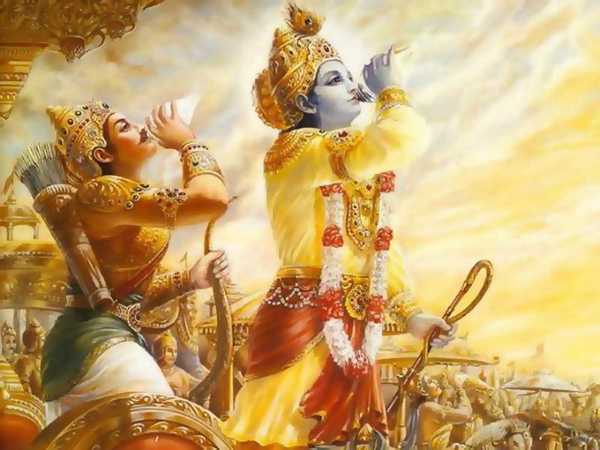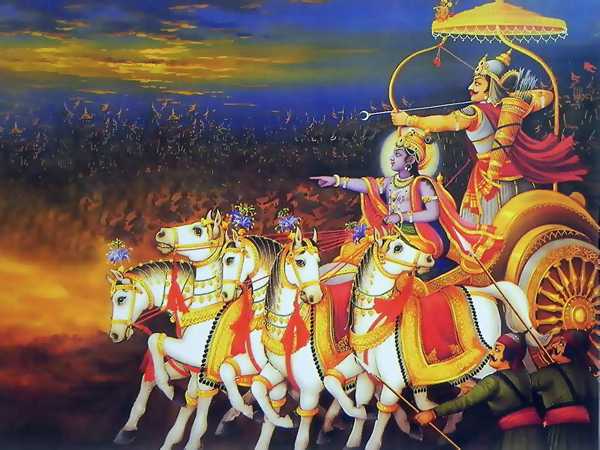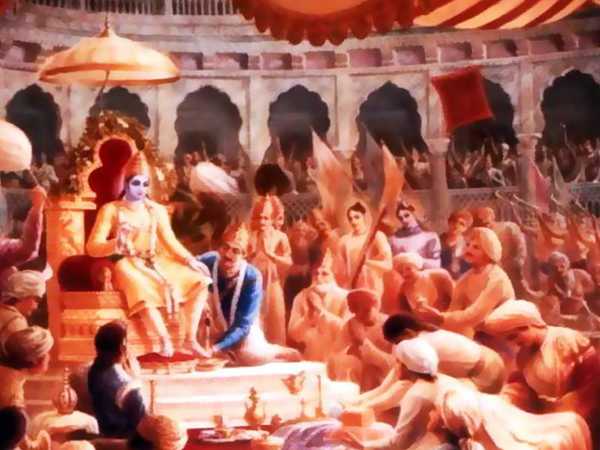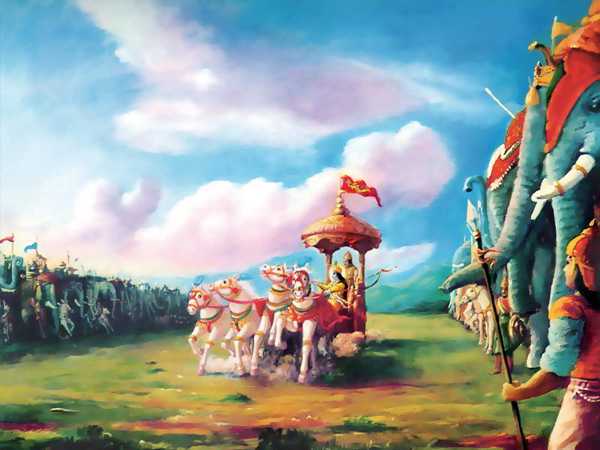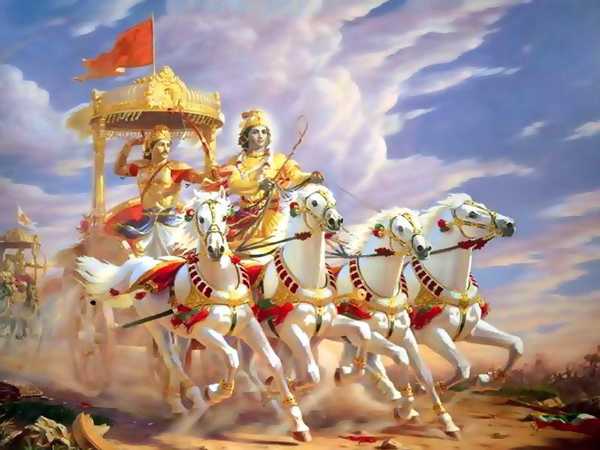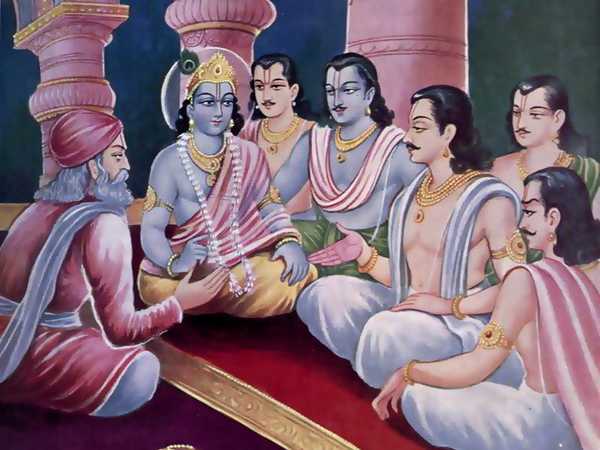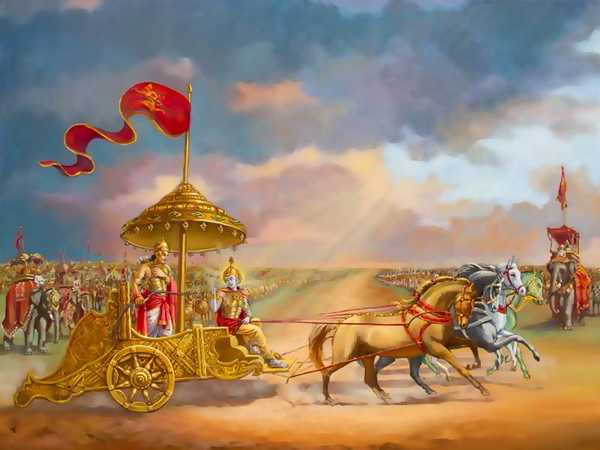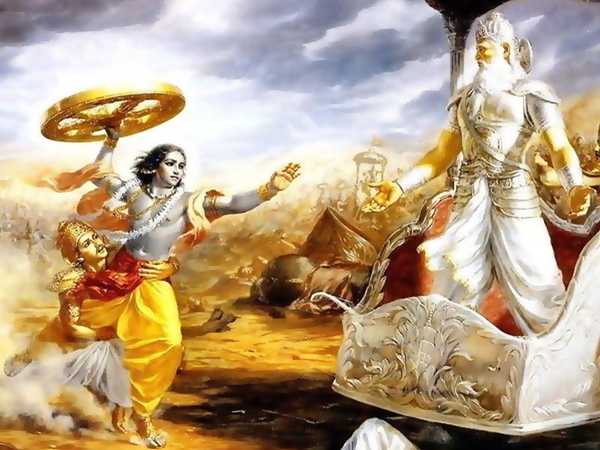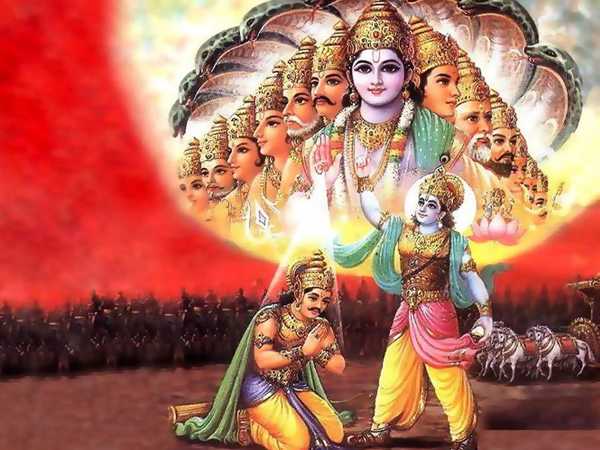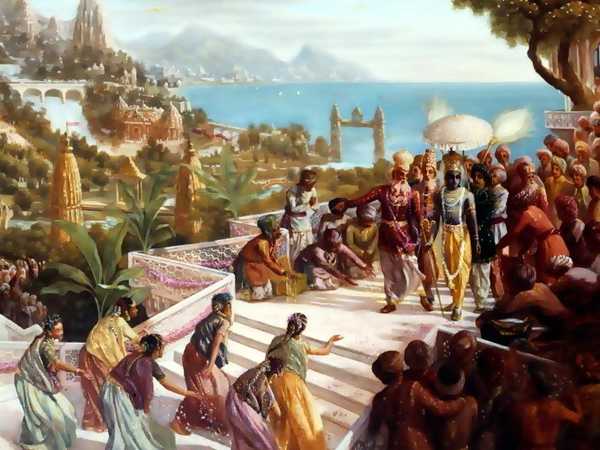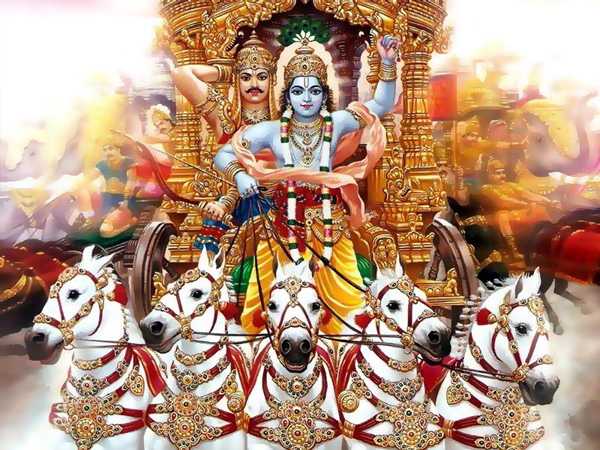Chapter 252
Vaisampayana continued, “Then, O bull among the Bharatas, that mightybowman, Karna, surrounded by a large army, besieged the beautiful city ofDrupada.
Chapter 252
“Vyasa said, ‘Unto a disciple that wishes to enquire after Emancipationafter having transcended all pairs of opposites and accomplished theconcerns of both profit and religion, an accomplished preceptor shouldfirst recount all that has been said in the foregoing section, which iselaborate, on the topic of Adhyatma.
Chapter 253
Vaisampayana continued, “O king, O lord of men, that slayer of hostileheroes, the Suta’s son, said these words to Duryodhana, ‘O KauravaDuryodhana, do thou lay unto thy heart the words that I shall tell thee;and, O represser of foes, after having heard my words, it behoveth theeto act accordingly every way.
Chapter 253
“Vyasa said, ‘Those that are conversant with the scriptures behold, withthe aid of acts laid down in the scriptures, the Soul which is clothed ina subtile body and is exceedingly subtile and which is dissociated fromthe gross body in which it resides.
Chapter 254
Vaisampayana continued, “Then all the artisans, the principalcounsellors, and the highly wise Vidura said unto Dhritarashtra’s son,”All the preparations for the excellent sacrifice have been made, O king;and the time also hath come, O Bharata.
Chapter 254
“Vyasa said, ‘There is a wonderful tree, called Desire, in the heart of aman. It is born of the seed called Error. Wrath and pride constitute itslarge trunk.
Chapter 255
Vaisampayana said, “While, O great king, Duryodhana was entering (thecity), the panegyrists eulogized the prince of unfailing prowess. Andothers also eulogized that mighty bowman and foremost of kings.
Chapter 255
“Bhishma said, ‘Do thou, O son, O sinless one, listen once more, withfeelings of great pride, to the words that fell from the lips of theIsland-born Rishi on the subject of the enumeration of the entities.
Chapter 256
“Yudhishthira said, ‘These lords of earth that lie on the earth’s surfaceamid their respective hosts, these princes endued with great might, arenow reft of animation. Every one of these mighty monarchs was possessedof strength equal to that of ten thousand elephants.
Chapter 256
Janamejaya said, ‘After having delivered Duryodhana, what did the mightysons of Pandu do in that forest? It behoveth thee to tell me this.’
Chapter 257
“Sthanu said, ‘Know, O lord, that my solicitations to thee are on behalfof the created beings of the universe. These beings have been created bythee. Do not be angry with them, O grandsire! By the fire born of thyenergy, O illustrious one, all the created beings are being consumed.Beholding them placed in such a plight, I am penetrated with compassion.Do not be angry with them, O lord of the universe.’
Chapter 257
Vaisampayana continued, “Dwelling in the woods, O bull of the Bharatarace, the high-souled Pandavas spent one and ten years in a miserableplight.
Chapter 258
Yudhishthira said, “Why did that high-souled one give away a drona ofcorn? And, O eminently pious one, to whom and in what prescribed way didhe give it? Do thou tell me this.
Chapter 258
“Narada said, ‘The large-eyed lady, controlling her grief by an effort ofher own, addressed the Grandsire, with joined hands and bending in anattribute of humility like a creeper.
Chapter 259
“The messenger of the gods said, ‘O great sage, thou art of simpleunderstanding; since, having secured that celestial bliss which bringethgreat honour, thou art still deliberating like an unwise person.
Chapter 259
“Yudhishthira said, ‘All men that inhabit this earth are filled withdoubts in respect of the nature of righteousness.
Chapter 26
“Sanjaya said, ‘After that elephant-division had been destroyed, OBharata, by the son of Pandu, and while thy army was being thusslaughtered by
Chapter 26
“Vaisampayana said,–‘Equal unto Vrihaspati in intelligence and Brahmahimself in forgiveness, resembling Sakra in prowess and Surya in energy,Bhishma the son of Ganga, of infinite might, had been overthrown inbattle by Arjuna.
Chapter 26
“Dhritarashtra said. ‘O Yudhishthira, art thou in peace and happiness,with all thy brothers and the inhabitants of the city and the provinces?
Chapter 26
“Yudhishthira said, ‘What words from me, O Sanjaya, hast thou heard,indicative of war, that thou apprehendest war? O sire, peace ispreferable to war.
Chapter 26
Sanjaya said,–“Unto him thus possessed with pity, his eyes filled andoppressed with tears, and desponding, the slayer of Madhu said thesewords.”
Chapter 26
Vaisampayana continued,–thus addressed, Dhananjaya replied untoBhagadatta, saying,–‘If thou wilt give thy promise to do this, thou hastdone all I desire. And having thus subjugated the king of Pragjyotisha,Dhananjaya of long arms, the son of Kunti, then marched towards thenorth–the direction presided over by the lord of treasures.
Chapter 26
“Sanjaya said, ‘Kripa, O king, resisted Dhrishtadyumna in battle, like aSarabha in the forest resisting a proud lion.
Chapter 26
“Vaisampayana said, ‘Having listened to these words of his spies, kingDuryodhana reflected inwardly for some time and then addressed hiscourtiers, saying, ‘It is difficult to ascertain the course of eventsdefinitely.
Chapter 26
“Sauti said, ‘And then Indra, the king of gods, having the best of horsesfor his bearer, thus adored by Kadru, covered the entire firmament withmasses of blue clouds. And he commanded the clouds, saying, Pour ye, yourvivifying and blessed drops!’ And those clouds, luminous with lightning,and incessantly roaring against each other in the welkin, poured abundantwater.
Chapter 26
Vaisampayana said, “In this connection, the high-souled Yudhishthira saidunto Arjuna these words fraught with reason.
Chapter 26
Vaisampayana said, “While the illustrious son of Pandu continued to dwellin the Dwaita woods, that great forest became filled with Brahmanas. Andthe lake within that forest, ever resounding with Vedic recitations,became sacred like a second region of Brahma.
Chapter 26
“The Brahmana said, ‘There is one Ruler. There is no second beside him.He that is Ruler resides in the heart. I shall speak now of him.
Chapter 26
“The holy one said, Arise, arise, O Gandhari, do not set thy heart ongrief! Through thy fault, this vast carnage has taken place!
Chapter 26
“Sanjaya said, ‘At Partha’s desire, Krishna then urged his white steeds,fleet as the mind and covered in golden armour, towards Drona’sdivisions.
Chapter 260
Janamejaya said, “While the high-souled Pandavas were living in thosewoods, delighted with the pleasant conversation they held with the Munis,and engaged in distributing the food they obtained from the sun, withvarious kinds of venison to
Chapter 260
“Yudhishthira said, ‘Thou sayest that righteousness or duty depends upondelicate considerations, that is indicated by the conduct of those thatare called good, that it is fraught with restraints (from numerous acts),and that its indications are also contained in the Vedas.
Chapter 261
Vaisampayana said, “One day, having previously ascertained that thePandavas were all seated at their ease and that Krishna was reposingherself after her meal, the sage Durvasa, surrounded by ten thousanddisciples repaired to that forest.
Chapter 261
“Bhishma said, ‘In this connection is cited the old narrative of theconversation of Tuladhara with Jajali on the topic of righteousness.
Chapter 262
Vaisampayana said, “These great warriors of the race of Bharata sojournedlike immortals in the great forest of Kamyaka, employed in hunting andpleased with the sight of numerous wild tracts of country and widereaches of woodland, gorgeous with flowers blossoming in season.
Chapter 262
“Bhishma said, ‘Thus addressed by the intelligent Tuladhara on thatoccasion, Jajali of great intelligence, that foremost of ascetics, saidthese words unto him.’
Chapter 263
Kotika said, “Excellent lady, who art thou that standest alone, leaningon a branch of the Kadamva tree at this hermitage and looking grand likea flame of fire blazing at night time, and fanned by the wind?Exquisitely beautiful as thou art, how is it that thou feelest not anyfear in these forests?
Chapter 263
“Jajali said, ‘This course of duty that thou, O holder of scales,preachest, closes the door of heaven against all creatures and puts astop to the very means of their subsistence.
Chapter 264
Vaisampayana continued, “The princess Draupadi, thus questioned by thatornament of Sivi’s race, moved her eyes gently, and letting go her holdof the Kadamva blanch and arranging her silken apparel she said,
Chapter 264
“Tuladhara said, ‘See with thy own eyes, O Jajali, who, viz., those thatare good or those that are otherwise, have adopted this path of duty thatI have spoken of.
Chapter 265
“Bhishma said, ‘In this connection is cited an old narrative of what wasrecited by king Vichakhy through compassion for all creatures.
Chapter 265
Vaisampayana said, “O Bharata, Kotikakhya related to those princes whohad been waiting, all that had passed between him and Krishna.
Chapter 266
“Yudhishthira said, ‘Thou, O grandsire, art our highest preceptor in thematter of all acts that are difficult of accomplishment (in consequenceof the commands of superiors on the one hand and the cruelty that isinvolved in them on the other). I ask, how should one judge of an act inrespect of either one’s obligation to do it or of abstaining from it? Isit to be judged speedily or with delay?’
Chapter 266
Vaisampayana said, “The daughter of Drupada, though naturally handsome,was suffused with crimson arising from a fit of anger.
Chapter 267
“Yudhishthira said, ‘How, indeed, should the king protect his subjectswithout injuring anybody. I ask thee this, O grandsire, tell me, Oforemost of good men!’
Chapter 267
Vaisampayana said, “Meanwhile those foremost of bowmen on the face of theearth, having wandered separately and ranged in all directions, andhaving slain plenty of deer and buffaloes, at length met together.
Chapter 268
“Yudhishthira said, ‘Thou hast already explained to me, O grandsire, howthe religion of Yoga, which leads to the six well-known attributes, maybe adopted and practised without injuring any creature.
Chapter 268
Vaisampayana said, “The hostile Kshatriyas, incensed at sight ofBhimasena and Arjuna, sent up a loud shout in the forest.
Chapter 269
“Kapila said, ‘Beholding that all the fruits that are attainable by actsare terminable instead of being eternal, Yatis, by adoptingself-restraint and tranquillity, attain to Brahma through the path ofknowledge.
Chapter 269
Vaisampayana said, “Meanwhile, the king of Sindhu was giving orders tothose princes, saying, ‘Halt, strike, march, quick’, and like.
Chapter 27
“Sanjaya said, ‘Duryodhana, O king, and thy son Sudarsa, the only two ofthy children yet unslain, were at that time in the midst of the (Kaurava)cavalry.
Chapter 27
“Yudhishthira said, ‘Thou O grandsire, art endued with wisdom andknowledge of the scriptures, with conduct and behaviour, with diversekinds of excellent attributes, and also with years. Thou artdistinguished above others by intelligence and wisdom and penances.
Chapter 27
“Vaisampayana said, ‘They passed that night which was characterised byauspicious constellations even thus, O king, in that retreat of righteousascetics.
Chapter 27
“Sanjaya said, ‘O Pandava, the world hath heard thy conduct beingrighteous. I see it also to be so, O son of Pritha.
Chapter 27
“Arjuna said,–‘If devotion, O Janardana, is regarded by thee as superiorto work, why then, O Kesava, dost thou engage me in such dreadful work?By equivocal words thou seemest to confound my understanding. Therefore,tell (me) one thing definitely by which I may attain to what is good.’
Chapter 27
Vaisampayana said,–“that heroic and foremost of the Pandavas endued withgreat energy, crossing the White mountains, subjugated the country of theLimpurushas ruled by Durmaputra, after a collision involving a greatslaughter of Kshatriyas, and brought the region under his complete sway.
Chapter 27
“Sanjaya said, ‘The white steeded (Arjuna) also, O monarch, routed thyforce even as the winds, approaching a heap of cotton, scatters it on allsides.
Chapter 27
“Vaisampayana said, “Endued with mighty energy and possessed of greatdiscernment, Drona then said, ‘Persons like the sons of Pandu neverperish nor undergo discomfiture.
Chapter 27
“Sauti said, ‘And then the Nagas drenched by that shower, becameexceedingly glad. And borne by that bird of fair feathers, they soonarrived at the island. That island had been fixed by the Creator of theUniverse as the abode of the makaras. There they saw the terrible LavanaSamudra (ocean of salt).
Chapter 27
“Yudhishthira said, ‘In consequence of the fall Abhimanyu of tenderyears, of the sons of Draupadi, of Dhrishtadyumna, of Virata, of kingDrupada, of Vasusena conversant with every duty, of the royalDhrishtaketu, and of diverse other kings hailing from diverse regions, inbattle, grief does not forsake my wretched self that am a slayer ofkinsmen.
Chapter 27
Vaisampayana said, “Exiled to the woods the sons of Pritha with Krishnaseated in the evening, conversed with one another afflicted with sorrowand grief.
Chapter 27
“The Brahmana said, ‘Having crossed that impassable fastness (the world)which has purposes for its gadflies and mosquitoes, grief and joy for itscold and heat, heedlessness for its blinding darkness, cupidity anddiseases for its reptiles, wealth for its one danger on the road, andlust and wrath its robbers, I have entered the extensive forest of(Brahman)’.
Chapter 27
Vaishampayana said, “Arrived at the auspicious Ganga full of sacredwater, containing many lakes, adorned with high banks and broad shores,and having a vast bed, they cast off their ornaments, upper garments, andbelts and girdles.
Chapter 27
“Dhritarashtra said, ‘Filled with rage, what did Partha, the son ofPandu, do to Bhagadatta? What also did the king of the Pragjyotishas doto Partha? Tell me all this, O Sanjaya!’
Chapter 270
“Kapila said, ‘The Vedas are regarded as authoritative by all. Peoplenever disregard them.
Chapter 270
Vaisampayana said, “Jayadratha flying for his life upon beholding thosetwo brothers with upraised arms, was sorely grieved and bolted off withspeed and coolness.
Chapter 271
“Yudhishthira said, ‘The Vedas, O Bharata, discourse of Religion. Profit,and Pleasure. Tell me, however, O grandsire, the attainment of which(amongst these three) is regarded as superior.’
Chapter 271
Janamejaya said, “What did those tigers among men, the Pandavas, do,after they had suffered such misery in consequence of the ravishment ofDraupadi?”
Chapter 272
“Yudhishthira said, ‘Amongst the diverse kinds of sacrifices, all ofwhich, of course, are regarded to have but one object (viz., thecleansing of the heart or the glory of God), tell me, O grandsire, whatthat sacrifice is which has been ordained for the sake only of virtue andnot for the acquisition of either heaven or wealth!'[1283]
Chapter 272
“Yudhishthira said, ‘Amongst the diverse kinds of sacrifices, all ofwhich, of course, are regarded to have but one object (viz., thecleansing of the heart or the glory of God), tell me, O grandsire, whatthat sacrifice is which has been ordained for the sake only of virtue andnot for the acquisition of either heaven or wealth!'[1283]
Chapter 272
“Markandeya said, ‘O bull of the Bharata race, even Rama sufferedunparalleled misery, for the evil-minded Ravana, king of the Rakshasas,having recourse to deceit and overpowering the vulture Jatayu, forciblycarried away his wife Sita from his asylum in the woods.
Chapter 273
“Yudhishthira said, ‘By what means doth a man become sinful, by what dothhe achieve virtue, by what doth he attain to Renunciation, and by whatdoth he win Emancipation?’
Chapter 273
“Yudhishthira said, ‘By what means doth a man become sinful, by what dothhe achieve virtue, by what doth he attain to Renunciation, and by whatdoth he win Emancipation?’
Chapter 273
Markandeya said, “The Muni named Visrava, who was begotten of half thesoul of Pulastya, in a fit of passion, began to look upon Vaisravana withgreat anger.
Chapter 274
“Yudhishthira said, ‘Thou hast said, O grandsire, the Emancipation is tobe won by means and not otherwise. I desire to hear duly what those meansare.’
Chapter 274
“Markandeya said, ‘Then the Brahmarshis, the Siddhas and the Devarshis,with Havyavaha as their spokesman, sought the protection of Brahma. AndAgni said, ‘That powerful son of Visrava, the Ten-headed cannot be slainon account of thy boon!
Chapter 275
“Bhishma said, ‘In this connection is cited the old narrative of thediscourse that took place between Narada and Asita-Devala. Once on a timeNarada, beholding that foremost of intelligent men, viz., Devala ofvenerable years, seated at his ease, questioned him about the origin andthe destruction of all creatures.’
Chapter 275
“Yudhishthira said, ‘O adorable one, thou hast described to me in detailthe history of the birth of Rama and others. I wish to learn the cause oftheir exile. Do thou, O Brahmana, relate why the sons of Dasaratha–thebrothers Rama and Lakshmana–went to the forest with famous princess ofMithila.’
Chapter 276
“Yudhishthira said, ‘Cruel and sinful that we are, alas, we have slainbrothers and sires and grandsons and kinsmen and friends and sons. How, Ograndsire, shall we dispel this thirst for wealth. Alas, through thatthirst we have perpetrated many sinful deeds.’
Chapter 276
“Markandeya said, ‘Beholding Ravana come, Maricha received him with arespectful welcome, and offered him fruits and roots.
Chapter 277
“Yudhishthira said, ‘Time, that is fraught, with terror unto allcreatures, is running his course. What is that source of good after whichone should strive? Tell me this, O grandsire!’
Chapter 277
“Markandeya said, ‘That heroic king of the vultures, Jatayu, havingSampati for his uterine brother and Arjuna himself for his father, was afriend of Dasaratha.
Chapter 278
“Yudhishthira said, ‘Of what behaviour must a man be, of what acts, ofwhat kind of knowledge, and to what must he be devoted, for attaining toBrahma’s place which transcends Prakriti and which is unchangeable?’
Chapter 278
“Markandeya said, ‘Afflicted with grief at the abduction of Sita, Ramahad not to go much further before he came upon Pampa–that lake whichabounded with lotuses of various kinds.
Chapter 279
“Yudhishthira said, ‘All men speak of ourselves as highly fortunate. Intruth, however, there is no person more wretched than ourselves.
Chapter 279
“Markandeya said, ‘And while the chaste Sita was dwelling there afflictedwith melancholy and grief on account of her lord, attired in mean garb,with but a single jewel (on the marital thread on her wrist), andincessantly weeping, seated on a stone, and waited upon by
Chapter 28
“Sanjaya said, ‘During the progress of that battle which was sodestructive of men and steeds and elephants, Subala’s son, Shakuni, Oking, rushed against Sahadeva.
Chapter 28
“Bhishma said, ‘Thus addressed by Indra, Matanga of restrained vows andwell regulated soul, (without hearkening to the counsels of the chief ofthe celestials), stood for a hundred years on one foot, O thou ofunfading glory.
Chapter 28
“Vaisampayana said, ‘After the high-souled Pandavas had all been seated,Satyavati’s son Vyasa said,–O Dhritarashtra of mighty arms, hast thoubeen able to achieve penances? Is thy mind, O king, pleased with thyresidence in the woods?
Chapter 28
“Yudhishthira said, ‘Without doubt, O Sanjaya, it is true that righteousdeeds are the foremost of all our acts, as thou sayest. Thou shouldst,however, ensure me having first ascertained whether it is virtue or vicethat I practise.
Chapter 28
“The Holy One said,–‘This imperishable (system of) devotion I declaredto Vivaswat: Vivaswat declared it to Manu; and Manu communicated it toIkshaku.
Chapter 28
Vaisampayana said,–in the meantime, Bhimasena also endued with greatenergy, having obtained the assent of Yudhishthira the just marchedtowards the eastern direction.
Chapter 28
“Sanjaya said, ‘King Duryodhana, O monarch, himself fearlessly receivedYudhishthira, as the latter was engaged in shooting large numbers ofshafts.
Chapter 28
“Vaisampayana said, ‘Then that grandsire of the Bharatas, Bhishma the sonof Sutanu, conversant with the Vedas, acquainted with the proprieties oftime and place, and possessing a knowledge of every duty of morality,after the conclusion of
Chapter 28
“Sauti said, ‘Garuda, thus addressed by the snakes, then said unto hismother, ‘I shall go to bring amrita, I desire to eat something in theway. Direct me to it.’ Vinata replied, ‘In a remote region in the midstof the ocean, the Nishadas have their fair home.
Chapter 28
Vaisampayana said, “Vyasa then dispelled the grief of the eldest son ofPandu., who, burning with sorrow on account of the slaughter of hiskinsmen, had resolved to make an end of himself.”
Chapter 28
“Draupadi continued, ‘On this subject, the ancient story of theconversation between Prahlada and Vali, the son of Virochana, is quotedas an example.
Chapter 28
“The Brahmana said, ‘I do not smell scents. I do not perceive tastes. Ido not see colours. I do not touch. I do not likewise hear the diversesounds (that arise). Nor do I entertain purposes of any kind.
Chapter 28
“Sanjaya said, Having slain Bhagadatta who was ever the favourite and Ifriend of Indra and who was possessed of great energy, Parthacircumambulated him.
Chapter 280
“Usanas said, ‘I bow to that divine and illustrious and puissant Beingwho holds this earth with the firmament in his arms. I shall speak tothee of the pre-eminent greatness of that Vishnu whose head, O best ofthe Danavas, is that Infinite place (called Emancipation).’


